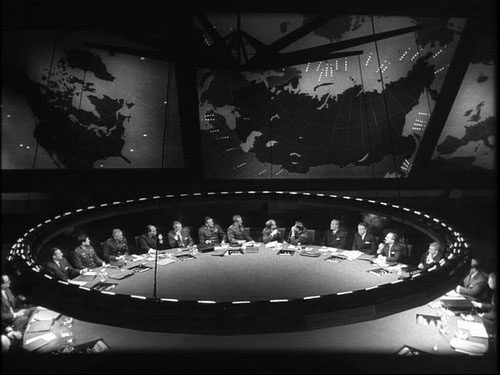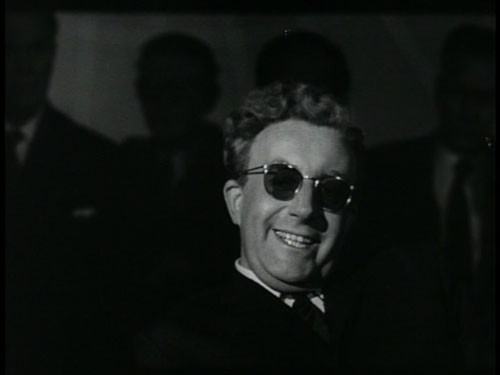January 24th, 2014, is the 50th anniversary of Stanley Kubrick’s cinematic masterpiece, Dr. Strangelove: Or How I Learned to Stop Worrying and Love the Bomb. A darkly satirical take on the Cold War in general and the Cuban Missile Crisis in particular, Dr. Strangelove has an enduring legacy. The American Film Institute ranks the film as the third best American comedy ever made and the 39th best film overall.
It would be a mistake to attribute this purely to the film’s wit. Make no mistake, the movie is funny. One famous scene, widely quoted, starts with an argument between the Russian ambassador and an American General which devolves into childish wrestling. The scuffle is then interrupted by a straight-faced declaration from the President: “You can’t fight in here! This is the War Room!”
But few comedies have endured like Dr. Strangelove, and Strangelove has remained oddly relevant to our modern day. In an era when the United States still has troops fighting all over the globe with no end in sight—and in which the threat of nuclear proliferation and widespread destruction remains a concern of all nations—Dr. Strangelove still has much to teach us about challenging the assumptions of unquestioned and undefined war against an implacable foe.

The movie tells the story of an accidental nuclear apocalypse, started by the insane General Jack Ripper, and of the efforts of the American and Russian governments to prevent the destruction of the world. A series of miscalculations, mistakes, and petty feuds culminate in a lone U.S. plane flying low over the Soviet countryside, determined to drop its nuclear payload onto a Soviet military base. They succeed, and in doing so set off a chain of events that leads to the activation of a doomsday device that will end all life on the planet.
The movie is a product of its specific time and gained particular resonance because it was released so soon after the Cuban Missile crisis put the fear of nuclear annihilation front and center in the American psyche. The film was based on a book released in 1959, entitled Red Alert, which tells the story of an insane General Quinten who goes rogue and intends to start nuclear war.
The book was a serious treatment of the danger of accidental nuclear war and led to the release of a similarly serious adaptation, the 1962 film Failsafe. But when Kubrick approached the project, he quickly decided that the Cold War wasn’t suited to a dour and gritty political thriller. The Cold War was a farce.
And so, rather than preaching to its audience about the possibilities of apocalypse, Dr. Strangelove became something more: a dismantling of the entire idea of the Cold War. Stanley Kubrick refused to take even the most fundamental assumptions of the Cold War seriously but instead stripped them down to their most absurd foundations.
The entire movie, from the opening credits that depict two airplanes having sex, to the conclusion in which a cowboy rides a nuclear missile into the nuclear sunset, makes the militarism of Cold Warriors into sublimated fears of sexual emasculation, showing war to be nothing more than Freudian macho-posturing.
The insane General Jack Ripper is the perfect anticommunist Cold Warrior and is shown to be paranoid and delusional, blaming communists for his sexual inadequacy and for stealing his “precious bodily fluids.” General Buck Turgidson, on the other hand, sees the entire Cold War as a game to prove masculine prowess, continually seeing nuclear war as a way to one-up the communists, even if it costs “no more than ten to twenty million killed, tops.” Even the President, named the emasculating entendre “Merkin Muffley,” has a relationship with the Soviet Premier less befitting two world leaders and more akin to squabbling spouses.
By exposing the false logic and the trivial nature of Cold War disputes, Dr. Strangelove earned its legacy and became more than just a funny film. Kubrick crafted an incisive (if cynical) argument against militarism, one that asks the question of whether the war needed to be fought at all.
Fifty years later, the world stage has changed dramatically. In place of the black and white choices of the Cold War (or, star-spangled and red as the case may be), we now find ourselves in a complicated world. With the emergence of the War on Terror, conflicts are no longer about containing communism but about rooting out terrorists and conspiracies all over the world.
Yet, as we fret about the spread of nuclear power to North Korea and Iran, it is clear we still haven’t yet learned to love the bomb.
The challenge today is not to match one other country missile for missile, as it was with the USSR, but to prevent the spread of nuclear technology at all. Rather than worrying about a single rogue Jack Ripper launching nuclear missiles, it seems as though tens or hundreds threats are found around the world.

